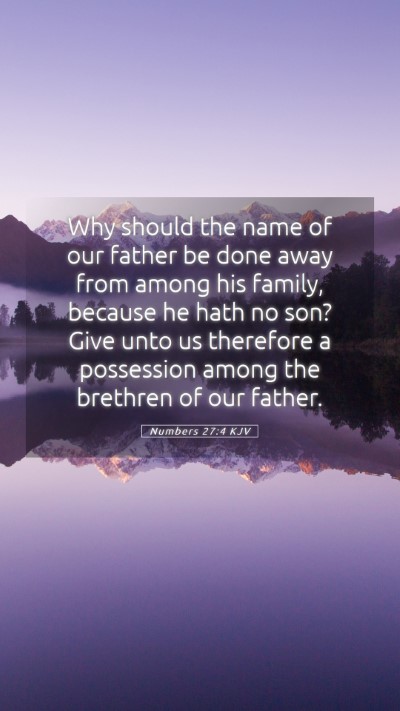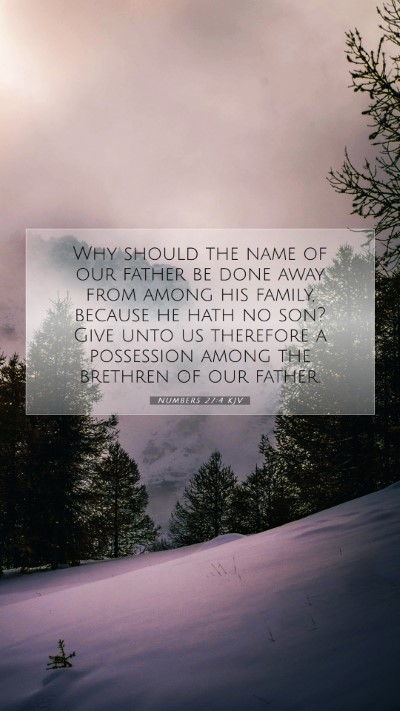Understanding Numbers 27:4
Bible Verse: Numbers 27:4 - "Why should the name of our father be done away from among his family, because he hath no son? Give unto us therefore a possession among the brethren of our father."
Bible Verse Meaning
This verse expresses a poignant concern by the daughters of Zelophehad regarding their inheritance rights in a patriarchal society. Their father died without any male heirs, and they are seeking equity and justice in receiving their father's inheritance. This request highlights the importance of family legacy and the cultural practices surrounding land possession in ancient Israel.
Interpretation of Numbers 27:4
The interpretations drawn from public domain commentaries shed light on the underlying themes of justice, inclusivity, and God's acknowledgment of the rights of all individuals irrespective of gender. Matthew Henry emphasizes the faith demonstrated by the daughters, who bravely approach Moses and the leaders to advocate for their rightful claim.
- Matthew Henry: Advocates for understanding the desire of the daughters as a legitimate plea for justice, illustrating God’s impartiality.
- Albert Barnes: Notes the significance of the future implications of this event in the context of inheritance laws in Israel.
- Adam Clarke: Highlights the cultural context of land inheritance, emphasizing how this verse illustrates God's care for all His people.
Insights from Bible Commentaries
The daughters' inquiry about their father's name illustrates the interconnected nature of family identity and public legacy. In biblical society, a family lineage was profoundly tied to land ownership, and these daughters are asserting the importance of their father's name continuing in Israel, despite the absence of male heirs.
Key Themes Explored
This passage can be seen as a reflection of several key biblical themes:
- Justice and Equity: The request implies a demand for equitable treatment within the inheritance laws of Israel.
- Legacy and Identity: It raises questions about how identity is preserved within a family structure and the significance of names.
- Divine Consultation: The daughters' approach suggests an early example of seeking God's will in matters of societal structure and personal rights.
Application of the Verse
Understanding this verse is critical for reflecting on modern applications of justice and equity. It serves as a reminder of the importance of advocacy for the voiceless and challenges us to consider how we uphold justice in our communities today.
Cross References
This verse connects to several other scriptural passages, expanding on the themes of inheritance and justice:
- Joshua 17:3-4: This continuation reveals how God’s command was executed in granting the daughters their inheritance.
- Deuteronomy 21:15-17: This passage discusses the rights of heirs and reinforces the concept of justice in inheritance.
- Galatians 3:28: A New Testament perspective on equity and inclusion in Christ, emphasizing that all are one in Him.
Concluding Thoughts
Numbers 27:4 encapsulates a powerful moment of advocacy that conveys significant Bible verse meanings surrounding justice and equity. This narrative serves not just as a historical account but as a source of Bible study insights for contemporary readers. It calls us to examine how we perceive and enact justice within our own contexts, ensuring all voices are heard.
Further Study
For those engaged in bible study groups or seeking online bible study, exploring the deeper meanings and implications of this verse can lead to profound discussions on gender equity, inheritance rights, and justice in the biblical sense. Utilizing bible study tools and resources can enhance understanding and application.


